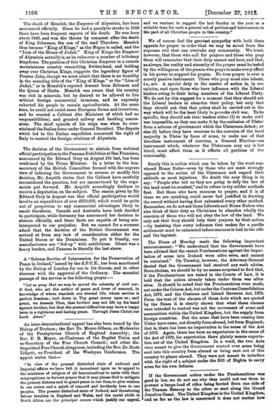The Times of Monday made the following important announcement: "We
understand that the Government have been advised that the recent Proclamations against the impor- tation of arms into Ireland were ultra vires, and cannot be sustained." On Tuesday, however, the Attorney-General denied that the Government had received any such advice. Nevertheless, we should be by no means surprised to find that, if the Proclamations are tested in the Courts of Law, it is held that the action already taken under them was ultra vireo. It should be noted that the Proclamations were made, not under the Crimes Act, but under the Customs Consolidation Act, 1876, and the Customs and Inland Revenue Act, 1879. From the text of the clauses of those Acts which are quoted by the Times it is clearly shown that what those clauses were intended to control was not the movement of arms and ammunition within the United Kingdom, but the supply from foreign countries. But the arms that have been coming into Ulster have come, not directly from abroad, but from England; that is, there has been no importation in the sense of the Act of 1876. Again, there has been no exportation in the sense of the Act of 1879, for exportation there plainly means exporta- tion out of the United Kingdom. In a word, the two Acts were meant to give the Government control over arms being sent into this country from abroad or being sent out of this country to places abroad. They were not meant to interfere with the right of a subject under the Bill of Rights to carry arms for his own defence.


































 Previous page
Previous page